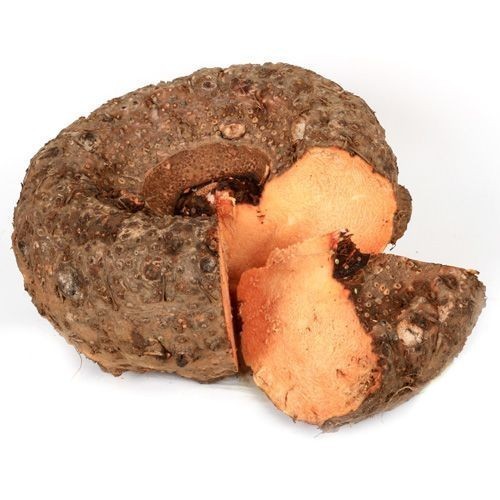Jimikand, or Elephant Foot Yam, is a tropical vegetable used for various cuisines and raised as a cash crop. Though it is not a fancy vegetable, it is known for many significant health benefits such as weight loss, skin beauty, obesity, heart diseases, etc.

Photo courtesy: indiamart
Ten wonder benefits of Jimikand
- Weight Loss-Elephant Foot Yam is known for healthy gut bacteria that play an essential role in digestion. If somebody is having the problem of acidity and bloating, weight loss can be achieved by these people by using this vegetable. It also has fibre, which is effective in controlling weight.
- Skin glowing– Suran contains a phytochemical called ‘Isoflavones’, which can combat many skin issues such as pigmentation and roughness.
- Control obesity-the veggie is full of vitamins, minerals and phytonutrients that give the feeling of a full stomach. Thus, eating it regularly will help to overcome obesity.
- Lifestyle diseases-The vegetable is also effective against lifestyle-related disorders such as diabetes and heart diseases due to the presence of multiple nutrients.
- Good for digestion– The Elephant Foot Yam is warm, which helps to stimulate bile secretion and improves metabolism, thus suitable for digestion.
- Regulates hormone production– Very few people know the significance of Jimikand in hormone production. Vegetable regulates the production of hormones in the body. Accordingly, it makes one healthier.
- Worms prevention- Eating elephant Foot Yam regularly is suitable for treating worms and the liver’s health.
- Cancer prevention– The vegetable contains anti-inflammatory and antioxidant substances that help to protect you from cancer.
- Improves memory- It contains a biochemical called diosgenin that helps to enhance memory.
- Detoxifier- It is considered one of the best detoxifiers.
Jimikand Cooking tips
After peeling the bark of Suran, it should be washed thoroughly to remove dust and dirt. Since it has astringent properties, it should be boiled in vinegar water. Unless or until you are ready to make dishes from this veggie, it should be kept submerged in water as it tends to discolour.
Jimi and dishes
- Chips- Tasty and crunchy chips can be made from this dish. If it boils on hot oil, the finely cut slice gives you a tasty snack.
- Curry- This is also one of the good ingredients to make curry, along with onion and tomato, mixed with other spices.
Different names of Jimikand
- Suran in Gujarat and Uttar Pradesh
- Elephant Foot Yam
- Amorphophallus paeoniifolius
- Whitespot Giant Arum
- Ol in Bangladesh
- Oal in Bihar
- Zimmikanda in Chhattisgarh
- Batema in Tripura
- Suvarnagadde in Karnataka
- Chena in Kerala
- Kaaraa Karunai Kizangu in Tamil Nadu
- Kaan or oal in Nepal
- Pongapong in Philippines
Best uses of Jimikand
- It is used in curries.
- The leaves, stems and corms are used as vegetables.
- In some places, it is used as pickles.
- Used as chutney along with mango and ginger.
- Its steamed pieces are also used.
- Its flower is used to make different types of dishes.
- As a medicine, it is also used in Ayurveda, Unani and Siddha.
- It is also beneficial in the treatment of piles.
Nutrition facts of Jimikand
It contains a sufficient amount of:
- Calories
- Fat
- Carbohydrate
- Protein
- Potassium
- Fiber
- It also contains vitamin B6, B1, riboflavin, folic acid, niacin, A, and beta-carotene.
Jimi and Precautions
- Patients with gout, kidney stones and hyperacidity should avoid it.
- Patients who have asthma/chronic cold should not take it.
- Pregnant women or lactating mothers should consume it only after the physician’s consultation.
- It should be skipped in case of sinus.
- Drinking yam juice can also cause vomiting, nausea and diarrhoea.




